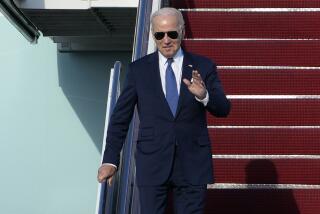Give Both Sides Some Incentive
- Share via
Can the talks in Rambouillet, France, on Kosovo succeed? The bloody conflict of the past year has made the situation appear hopeless. The warring parties’ demands--the Kosovar Albanians want independence and the Serbs want continuing sovereignty--appear irreconcilable.
The U.S. and Europe have decided to freeze these contradictory demands by imposing a three-year international protectorate over a self-governing Kosovo that would remain within Yugoslavia. This general approach is acceptable to both sides. Only with a substantial NATO ground force, which the Serbs will resist, can it succeed.
Major issues remain to be decided at Rambouillet: Will Serb security forces be withdrawn? What responsibilities will NATO have and how will it share them with international civilian authorities? What will happen after three years?
The draft agreement is firm on reduction and eventual withdrawal of the Yugoslav police and demobilization of the Kosovo Liberation Army, but the Yugoslav army would keep more troops in Kosovo than needed for border patrols. They will become a target for Albanian extremists and a constant source of friction. The principle should be strict: NATO in, Yugoslav security forces and Kosovo Liberation Army out.
International civilian authority would be vested primarily in the more than 30-nation Kosovo Verification Mission, which would supervise the Yugoslav police and order their withdrawal. Such powers will only be effective if the American mission chief has 100% support from NATO, which will have a European ground commander.
The division of civilian and military commands is a mistake. It would be better to make the NATO military commander also responsible for civilian implementation.
After the three-year interim period, the Kosovar Albanians will want an independence referendum, which would obviously win. The Serbs and the international community are correct in refusing to leave up to the Kosovars a decision that could have dramatic consequences for Yugoslavia’s future and south Balkans stability.
The decision process established at Rambouillet should give the warring parties incentives to behave during the three-year interim period. The decision on Kosovo’s ultimate status would be made by the international community, not on the basis of historical claims and counterclaims but on the basis of the performance of the parties in meeting their obligations during the next three years.
The Kosovar Albanians should use the period of self-governance to demonstrate that they are ready to meet the responsibilities of statehood by treating the Serbs and other minorities in Kosovo with respect and by proving that an independent Kosovo will not destabilize Macedonia or Albania. The Serbs should use the interim period to demonstrate that political and economic reform in Serbia is sufficiently advanced to make it attractive for Kosovo to remain within Yugoslavia.
If the Rambouillet agreement removes Serb security forces and sets up a peaceful “virtue contest” of this sort--conducted under unified international military and civilian protection and supervision--it will be a success.
More to Read
Sign up for Essential California
The most important California stories and recommendations in your inbox every morning.
You may occasionally receive promotional content from the Los Angeles Times.













